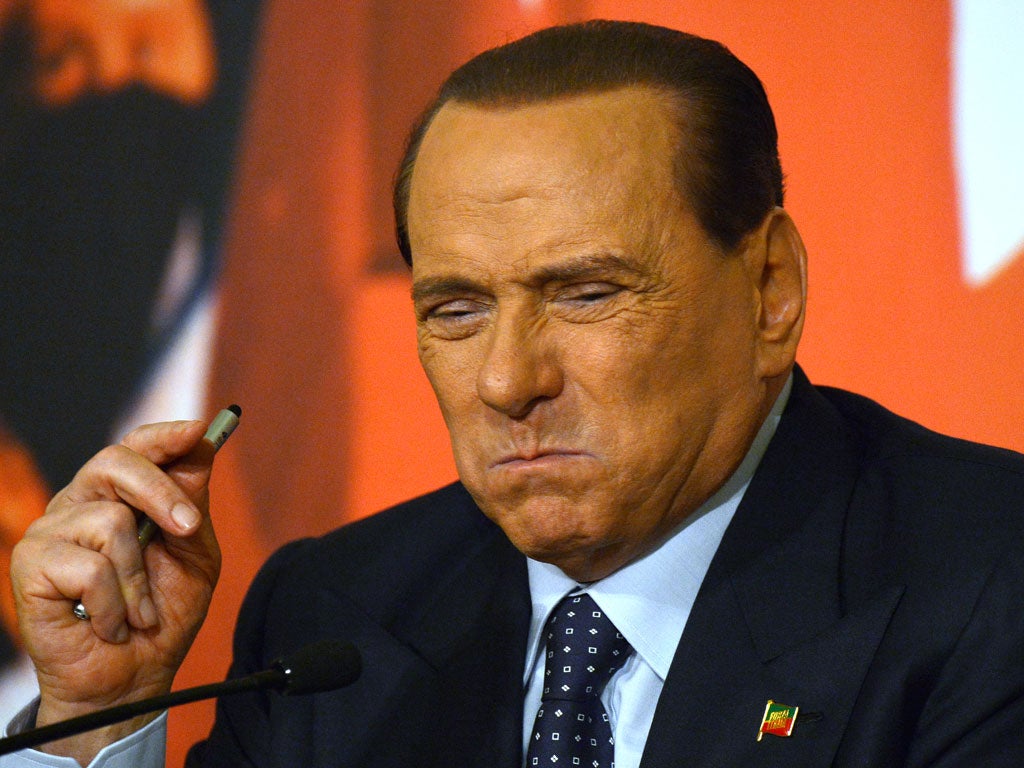If you’re surprised by the outcome of the Italian elections, you haven’t been paying attention
Silvio Berlusconi is the godfather of populism – things are bad when he’s being viewed as a moderate

Another year, another inconclusive Italian election. There could now be weeks of political horse-trading before a government can be formed. This is an Italian speciality: there have been 65 governments since 1946. So far, so predictable. And yet this poll has been widely described as having produced at least one clear outcome – a collapse of the centre and a victory for the anti-establishment populists.
Undeniably, the two parties that saw the biggest electoral gains, the Northern League and the Five Star Movement (M5S), both want to rock the boat – hard. They are both looking to undo pension and labour market reforms, challenge the EU’s fiscal rules, launch more protectionist trade policies and seek better ties with Russia. Both are Eurosceptic, albeit to different degrees, and both have a penchant for conspiracy theories and pseudo-science, having supported a recent Europe-wide campaign against obligatory vaccinations.
Matteo Renzi’s centre-left, Democratic Party (PD) and Silvio Berlusconi’s centre-right Forza Italia saw their vote shares falling a long way below expectations. The election was especially calamitous for Renzi, who four years ago seemed to herald a new, reforming era in Italian politics.
But the much-touted shift from centrism to populism as the dominating political force in Italy is largely illusory. The Eurosceptic, anti-establishment, conspiratorial rhetoric of the League and M5S has been in full use for many years – by the godfather of modern populism, Silvio Berlusconi.
The perma-tanned media mogul won three elections by bashing immigrants, the EU, the “left-wing establishment” (particular favourites of League leader Matteo Salvini) and "international finance" (a regular target for M5S founder Beppe Grillo).
For 25 years he has portrayed himself as a non-politician, an exception to the corrupt, out-of-touch establishment, leading a party of what he called “businessmen”. To that end, ahead of the 1994 election, he branded Forza as “outside the political system” by fielding, almost exclusively, novice candidates – a core strategy of the anti-establishment M5S.
Meanwhile, Berlusconi’s multiple sex scandals and 20 trials on charges ranging from false accounting to bribing judges were leveraged by the tycoon to prove his anti-establishment credentials: it all was proof the judiciary were out to get him. One of his solutions, a promise to reform the magistrates, went down well with Italians sick of the excruciatingly slow legal system.
Berlusconi’s tendency to blame Italy’s woes on dark external forces – the foreign press, foreign banks, German economic power – was either amplified, echoed or merely left unquestioned by his colossal media empire. “He invented fake news,” says Massimo Giannini, a comment writer at La Repubblica. During Italy’s sovereign debt crisis in 2011, which resulted in near-default and Berlusconi’s resignation, the mogul claimed that the resulting austerity measures were the result of an international conspiracy against him.
“If this sort of thing is said often enough on TV talk shows, then people start to believe it,” says Elsa Fornero, who was labour and pensions minister in Mario Monti’s technocratic government in the wake of the crisis.
M5S, which has built a network of websites and social media accounts that spread conspiracy theories, pro-Kremlin stories and rants against the mainstream media, has slotted itself neatly into the debased, post-truth environment created by Il Cavaliere (“The Knight”, the moniker the Italian press has given Berlusconi). The same applies for the League, whose relentless focus on immigration became the dominant issue in the election.
Berlusconi and Italy’s hard right go back a long way. Over the years, he forged several pacts with the Northern League, and sometimes tried to court its electoral base. The former leader of the League, Umberto Bossi, notoriously ordered the navy to shoot at boats carrying illegal immigrants while serving as a minister in Berlusconi’s cabinet in 2003. And in 2010, Berlusconi said that while illegal immigrants were not welcome in Italy he would make an exception for "beautiful girls".
Partly under the influence of the League, who always saw the EU as a nest of left-wingers, Berlusconi began cooling on the idea of a European Community a few weeks before the introduction of the euro in 2002, opposing the European arrest warrant and rejecting the proposed location of the food standards agency. When the single currency did arrive, Italian businesses took the switch as an opportunity to double their domestic prices. Berlusconi refused price controls because “he was compensating his electoral base – owners of small businesses – for having failed to keep his campaign promise that there would be no more tax rises”, comments Giannini.
The result was a dramatic collapse in consumer demand. By 2005, Berlusconi was blaming Italy’s dire economic state on the single currency, saying euro had "screwed everybody".
Berlusconi’s economic negligence, and the 15-year crisis that has accompanied it, has provided the political extremists with a deep wellspring of anger on which to draw. His second term as prime minister, from 2001 to 2006, was a window of opportunity to reshape struggling Italian industry in the face of Chinese competition. “He had the biggest majority in the history of the Republic, the world economy was doing fine. He could have done all the reforms that were necessary, but he didn’t. He was too busy looking after his own interests,” says Giannini.
Ironically, in the run up to the election last Sunday, political moderates across Italy and Eurocrats in Brussels began to see the 81-year-old billionaire as a relative moderate who could save Italy from the populists – akin to hoping that the arsonist might put out the fire.
Join our commenting forum
Join thought-provoking conversations, follow other Independent readers and see their replies
Comments